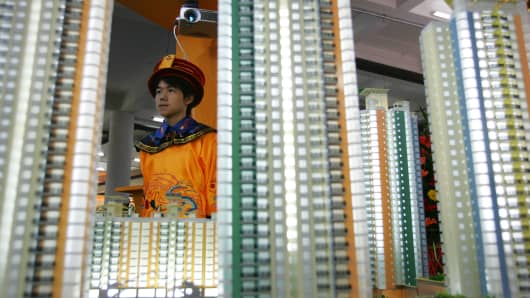Rising home prices in China, which grew at the fastest pace in May this year, makes it difficult for policymakers to loosen monetary policy in a bid to boost growth, which could result in further downside for the economy, say market watchers.
The central bank in the world's second largest economy has been facing the challenging task of trying to balance the need to support a slowing economy against curbing housing inflation.
But Zhiwei Zhang, chief China economist at Nomura, said it's unlikely the People's Bank of China (PBOC) will ease monetary policy given the continuing increase in real estate prices.
"Rising property prices make it difficult for policymakers to loosen monetary policy, at least in the short term," Zhang said in a note on Tuesday. "We expect the government to continue focusing on containing financial risks before the second quarter data release on 15 July," referring to leveraging and shadow banking activity that has led to elevated property prices.
Average home prices in 70 major Chinese cities rose 6 percent in May from a year earlier, following a two-year high of 4.9 percent in April, Reuters reported.
(Read More:
China Home Prices Raise to Fastest Pace This Year
)
Prices have continued to rise despite a series of fresh measures by the government in March to cool the sector, like a stricter enforcement of a 20 percent capital gains tax and an increase in down payments and mortgage rates on second homes in cities with the fastest rising prices.
(Read More:
China Property Boom Shows No Sign of Abating
)
While there is some evidence that the measures may be working with house prices rising 0.9 percent in May on a monthly basis, compared to 1 percent the previous month, Du Jinsong, head of Asia property research, Credit Suisse said house prices will continue to jump at least 5 percent this year.
"In June, bank loans increased quite substantially and I think that at least half of the increase is going to the housing market - which is going to help the housing price," Du said, adding that a weak economy is going to prevent the central government from introducing any broad measures across the country to curb prices.
"The economy is still weak. The central government will not come with any measures to apply to the whole country - they will ask local governments to do it on a regional basis and that probably won't change the trend [of rising prices]," Du added.
A series of negative economic data out of China in May, like a contraction in factory activity for the first time in seven months and weak export growth, have added to fears that recovery in the powerhouse economy may be losing steam. That has lead a series of major banks and international agencies to downgrade their economic growth forecast for China in 2013, with Nomura calling gross domestic product to fall as low as below 7 percent in the second half.
(Read More:
Now, China Watchers See Growth Below 7%
)
Tight Liquidity Conditions
Zhang of Nomura said the outlook for property prices depends on the central bank's monetary policy stance over the next several months, and since it's likely the government wants prices to come down, tight liquidity conditions will remain.
"We maintain our view that downside risks to growth have increased," Zhang said, citing the rise in property prices.
Klaus Baader, chief Asia Pacific economist, Societe Generale backed that sentiment saying the central bank would tighten liquidity rather than loosen it.
"Given these house price trends, the continued resistance of the PBOC to ease the tight liquidity conditions in the money market is quite understandable, despite pressure from many banks to cut the Required Reserve Requirement," Baader said in a note. "In fact, rather than adding cash, the bank sold 2 billion yuan ($326 million) of 91-day notes, draining liquidity."
- By CNBC.com's Rajeshni Naidu-Ghelani; Follow her on Twitter @RajeshniNaidu


